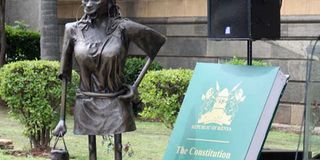Two-thirds gender rule must be passed, implemented at all costs

The space of the Kenyan woman in leadership continues to shrink by the day despite the Constitution recognising women, youth, persons with disabilities and ethnic minorities as special groups deserving protection. FILE PHOTO | WILLIAM OERI |
What you need to know:
Article 81 states that the electoral system shall comply with the principle that not more than two-thirds of the members of elective public bodies shall be of the same gender.
The top leadership of Parliament, for instance, is composed of men only — unlike the last House, where both the deputy speaker and deputy majority leader were women.
The two-thirds gender rule would institutionalise increased participation for women in decision making; without them in these positions, there will be no true development in Kenya.
The space of the Kenyan woman in leadership continues to shrink by the day despite the Constitution recognising women, youth, persons with disabilities and ethnic minorities as special groups deserving protection.
Article 81 states that the electoral system shall comply with the principle that not more than two-thirds of the members of elective public bodies shall be of the same gender.
Article 27 obligate the government to develop and pass policies and laws, including affirmative action programmes and policies, to address past discrimination.
But despite Article 177 ensuring that the two others above are complied with at the county level through the nomination of special seat members, the same is not guaranteed at the National Assembly and the Senate.
Eight years later, Kenyan women are yet to fully enjoy the benefits of the 2010 Constitution. Any gains made are being lost everyday with spaces occupied by women being taken over by men.
The top leadership of Parliament, for instance, is composed of men only — unlike the last House, where both the deputy speaker and deputy majority leader were women.
IGNORE WOMEN
The Executive continues to ignore women in appointments despite public assurances of their support of women. County governments have followed the national government and continue to violate the Constitution and deny women their rightful place in leadership positions.
Over the past two weeks, Parliament’s Justice and Legal Committee has engaged in public participation on a proposed law change in line with court decisions and the Fifth Schedule to the Constitution. The Bill seeks to amend the Constitution for the membership of the National Assembly and the Senate to conform to the two-thirds gender principle through creation of special seats over 20 years from the next elections.
LAGS BEHIND
Kenya lags behind neighbours Uganda, Rwanda and Tanzania in having women in leadership and political decision-making positions. But by implementing the two-thirds rule, it would correct historical injustices against vulnerable groups that have enhanced inequalities.
Besides the progressive 2010 Constitution, Kenya has established several commissions to collectively address the challenges. It has also ratified the African Charter on Human and Peoples’ Rights on the Rights of Women in Africa, which explicitly requires countries to enforce laws prohibiting violence against women and to punish the perpetrators.
Kenya is also a State party to the African Charter, the International Covenant on Civil and Political Rights (ICCPR) and the Convention on the Elimination of All Forms of Discrimination against Women (Cedaw), which also require women’s protection against violence.
It has also ratified the United Nations Security Council Resolution 1325, which calls for equal participation of women in decision-making bodies through the Kenya National Action Plan in 2016.
DISSOLVE PARLIAMENT
Failure by the National Assembly to pass the Constitution of Kenya (Amendment) Bill 2018 by at least a two-thirds majority at the Second Reading would mean the only recourse — as per the Constitution, and the judgments of the Supreme Court in 2012 and High Court in 2015 and 2017, and the advisory by the National Gender and Equality Commission — would be invocation of the provisions of Article 261 (6) and (7), to dissolve Parliament.
Further, President Uhuru Kenyatta will need all the support for his ‘Big Four’ agenda to succeed. The main factor that will make or break that legacy will be inclusion of women and men in all the four pillars.
The two-thirds gender rule would institutionalise increased participation for women in decision making; without them in these positions, there will be no true development in Kenya.
Ms Mohamed is a gender consultant and director Women Center for Peace and Development. [email protected]




